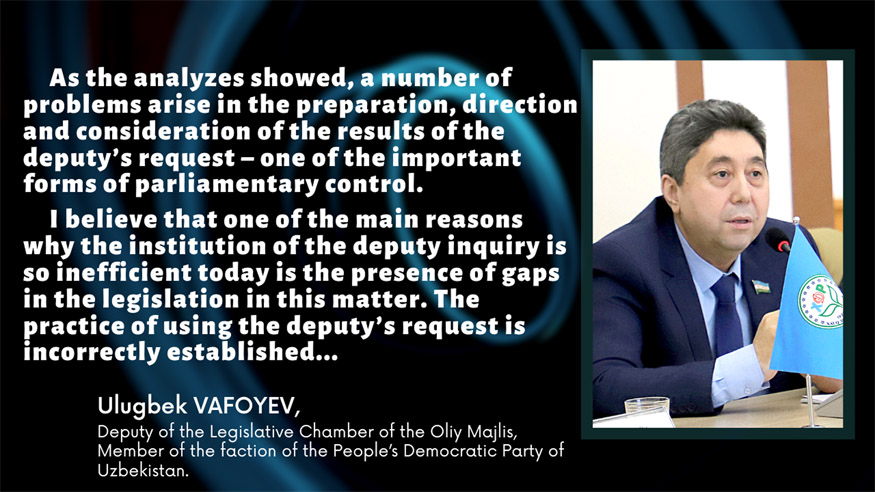
President of the Republic of Uzbekistan Shavkat Mirziyoyev in his report at the first meeting of the Legislative Chamber of the Oliy Majlis paid special attention to the issue of strengthening parliamentary control. Indeed, at the current stage of reforms in the context of rapid global development, increasing the effectiveness of parliament is important in establishing effective activities of the executive branch.
In recent years, a new form and mechanisms of parliamentary control have been created in Uzbekistan. In particular, the Legislative Chamber introduced a procedure for listening to answers of members of the government to questions from deputies – the “Government Hour” institute, as well as a procedure for providing clarifications to parliament by responsible leaders on pressing issues that cause controversy and discussion among the public.

In addition, since 2019, the practice of considering candidates for members of the Cabinet of Ministers at the meeting of the lower house has been established. The effectiveness of control and analytical work of the committees of the Legislative Chamber and factions of political parties has significantly increased.
However, there are also certain problems in further enhancing the effectiveness of parliamentary control, as well as unused opportunities in this direction.
As the analyzes showed, a number of problems arise in the preparation, direction and consideration of the results of the deputy’s request – one of the important forms of parliamentary control.
I believe that one of the main reasons why the institution of the deputy inquiry is so inefficient today is the presence of gaps in the legislation in this matter. The practice of using the deputy’s request is incorrectly established.
It should be emphasized that the effectiveness of a deputy’s request is determined not only by the potential of the deputies themselves. The deputy is a representative of people. Not every deputy is a lawyer: one farmer, another builder, a third – an entrepreneur. That is, it is quite natural that not all deputies have the skills to prepare relevant legislative acts.
The deputy’s main task is to raise urgent problems and submit ideas. And other issues, such as bringing the problem raised by the deputy to necessary form, its consideration from a legal point of view require a systematic approach.
Based on the legislation, a deputy request is defined as a form of parliamentary control. Consequently, the process of preparing, sending and discussing the results of the deputy’s request should be approached as a document coming from the parliament.
The legislation of Uzbekistan defines in detail the process associated with the parliamentary request. As is known, the Legislative Chamber of the Oliy Majlis of the Republic of Uzbekistan has the right to send a parliamentary request to officials of state authorities and administrations with a request to provide a reasonable explanation or state its position on issues within their competence.
A proposal to send a parliamentary request is submitted to the Legislative Chamber for consideration by committees, factions, as well as deputies of the Legislative Chamber in an amount of at least one fifth of their total number. The draft resolution of the Legislative Chamber on the parliamentary request is sent to the Speaker of the Legislative Chamber by the initiators of the request for introduction in the agenda of the next meeting of the Legislative Chamber.
The draft resolution of the Legislative Chamber should be accompanied by a draft parliamentary request, as well as other necessary materials. The draft parliamentary request should contain proposals on the form of response (oral or written) to the parliamentary request.
The Legislative Chamber decides to send a parliamentary request by a majority vote of the total number of deputies. Officials of state bodies and economic management bodies provide an oral response to the parliamentary request at the meeting of the Legislative Chamber during the established period.
My suggestion is to implement the same specific procedure with regard to the deputy’s request, a specific mechanism of this process should be introduced into the legislation.
In this case, the deputy’s request will differ from the Parliamentary request, primarily by its initiator. That is, the initiators of the Parliamentary request are committees and factions, and of the deputy request – the deputies themselves.
In addition, unlike the Parliamentary request, the Deputy request will, as a rule, be related to ensuring the rights and legitimate interests of voters of the respective constituency.
Otherwise, the mechanism should be identical. What is the advantage of this approach, you ask?
Firstly, the quality of the deputy request will increase. Qualitative preparation of the deputy request will be entrusted not only to the deputy. The deputy will raise the problem, and its formation, deep justification will be carried out with participation of relevant departments and committees of the Legislative Chamber.
Secondly, the deputy request will become more significant. The draft deputy request will be discussed at the meeting of the Legislative Chamber, approved as a deputy request and sent to the appropriate body of economic management. Consequently, the responsibility of officials will increase in relation to the deputy request approved by the decision of the Parliament itself.
Thirdly, the effectiveness of the deputy request will increase. Officials of economic management bodies will not provide information to deputies, but to the parliament, that is, they will be responsible to the parliament. This will serve to strengthen the responsibility of officials, and as a result, increase the effectiveness of the deputy request.
Undoubtedly, the transition to such an order can cause a reduction in the number of Deputy requests, an increase in the number of issues considered at plenary meetings, however, along with this, their quality and effectiveness will increase, and deputy requests will serve the interests of people.
Ulugbek VAFOYEV,
Deputy of the Legislative Chamber of the Oliy Majlis,
Member of the faction of the People’s Democratic Party of Uzbekistan.
